An important point of the EU-Serbia negotiations will be respect for human and minority rights, both ethnic and LGBT rights, says Head of the EU Delegation to Serbia Michael Davenport. He expressed support to the new media laws, but said that an overall state of media was “unsatisfactory” and some of the phenomena were very unpleasant and unacceptable.
In an interview with FoNet, cconducted in Serbian language, Davenport said that Serbia had signed all of the international agreements and conventions in the area of human and minority rights, so their implementation should be in line with international commitments and standards.
This is why “we want to start negotiating this particular priority,” within the chapter 23, Davenport said, adding that it was of great importance for the strategy of fighting against discrimination to be implemented through appropriate action plan.

The EU “strongly supports” media reform, based on the set of laws prepared by the previous government, said Davenport and added that draft laws on public information and electronic media have already been prepared, whereas there is “more work left to do” when it comes to public service media laws. It is encouraging that the Prime Minister Aleksandar Vučić in his presentation of the government’s programme to the Parliament included the set of media laws whose adoption is one if the priorities for the government.
“Of course adopting these new laws matters, but what is also important is their implementation,” Davenport said, adding that roles of the Parliament and civil society would be important for this process.
“I believe everybody knows that an overall situation with the media is unsatisfactory, therefore these new laws are of great importance,” Davenport said and pointed out the existence of ”other, rather unpleasant or even unacceptable phenomena.”
“For instance, the fact that information concerning official investigations is being revealed to public through a number of media, is unacceptable – it doesn’t benefit citizens’ rights, or a fair and democratic system in Serbia,” Davenport said.
“Attacks towards certain persons and organisations we see in your media, conducted in a personal and unacceptable manner, are extremely dangerous. However, it is a good thing that government’s representatives condemned these attacks, and I am referring to two cases in particular,” said Davenport, adding that these attacks were nevertheless alarming.
At the same time, comparisons between criminals and representatives of civil society represent “a clear breach of human rights, as well as rights of these individuals and organisations,” he said.
“We expect the relevant institutions to respond to such situations,” said Davenport and added that it necessary to strengthen the role of independent institutions, such as Press Council and Broadcasting Agency.
“The responsibility also lies with media – editors and journalists should increase the level of professionalism through their associations,” said Davenport.
Media funding is another issue to be tackled, Davenport said, explaining that one of the important objectives of the new set of laws is achieving financial transparency, state-funding in particular, as well as media ownership transparency.
Media project financing is an important concept, but achieving procedures’ transparency will be challenging through this concept, and without transparency, there is no progress and the improvement of situation, Davenport said.
“I ought to say public service media play an important role,” Davenport said, adding that it is important for public service media to criticise the authorities, but what also matters is “the authorities to have an understanding for media criticism.”
Undoubtedly, phenomenon of self-censorship exists, not only in Serbia, Davenport said, but the authorities and government’s institutions are expected to make efforts towards fostering freedom of expression.
“And vice versa: any kind of media pressure is of course unacceptable,” Davenport said and added that it was highly positive that the media strategy came to be one of the key priorities.
According to Davenport, new government has a chance to improve the overall situation regarding media, but this can be achieved only through efficient cooperation with media sector and media organisations’ representatives, with an active participation of civil society.
When asked to what extent this could be achieved, not only in media, but in other areas as well, given that the authorities have no serious corrective service, due to weakened opposition, Davenport answered that “every democracy needs opposition.”
“I believe Serbian opposition plays an important role inside and outside the Parliament, the role of expressing an opinion and criticizing – much needed signs of a healthy democracy,” Davenport concluded.



